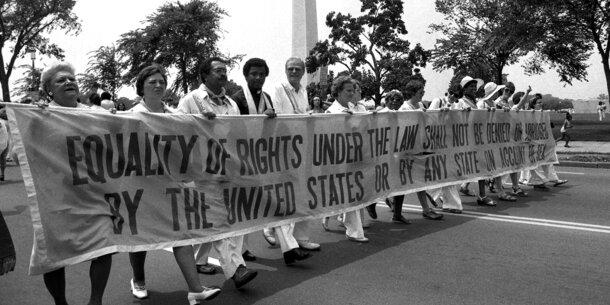More than half a century has passed since Congress last proposed a successful amendment to the Constitution. Adopted in 1971, the 26th Amendment lowered the national voting age to 18. It was the fourth addition to the Constitution in the span of 10 years. Remarkably, the measure won the approval of the requisite 38 states in just 100 days, the fastest ratification on record.
But then, in a pattern that has repeated itself throughout American history, the momentum for constitutional reform slowed. After the Equal Rights Amendment was thwarted in the 1970s by a demagogic campaign that presaged a sharp turn to the right in our nation’s politics, progressive reformers pulled back. Today, only a few hardy reformers see much value in cranking up the unwieldy mechanism of Article V to repair a Constitution that too often fails to meet today’s needs. The dispiriting common wisdom, subscribed to by many progressive scholars and reformers today, is that our Constitution is simply “unamendable.”
But can this be true? In today’s contentious and fractured politics, it may seem difficult to imagine forging the broad consensus needed to pass a constitutional amendment under the two-step process of Article V, which requires supermajority approval in Congress and the states. But as Brooklyn Law School’s Wilfred Codrington and I argue in our book, The People’s Constitution: 200 Years, 27 Amendments, and the Promise of a More Perfect Union, this disempowering sense of futility is nothing new. Amendments have come mainly in short bursts, spurred by social movements and visionary leaders, only to be followed by decades-long dry spells, when reformers look to other avenues of reform.
In this way, our national charter has been reformed — and its principles renewed — in four waves of change linked to some of the most turbulent times in American history, from the fight to ratify the Constitution to Reconstruction’s promise of a “second founding” to the reform boom of the Progressive Era to the 1960s’ movements for civil rights.
As this history reveals, previous generations of Americans have made our Constitution more democratic, more inclusive, and more suited to the needs of a changing country through the mechanism of Article V. It’s an inspiring story of progressive change. Yet today, the arena of constitutional reform is dominated by conservative activists who have launched campaigns to radically curtail the power of the federal government. Those ambitious efforts have only bolstered a sense among progressives that it’s unwise and even dangerous to tinker with the framers’ handiwork, keeping these reformers stuck on the sidelines.
On February 16, the Brennan Center will host Constitutional Amendments: Time to Rethink? — an academic symposium exploring the prospects for amending the Constitution in our time. The day’s discussion, led by a lineup of prominent thought leaders drawn from the fields of politics, journalism, academia, and reform advocacy, will consider whether improving the Constitution through the Article V amending process remains a vital and viable means of advancing legal change in the 21st century.
At the symposium, leading experts will examine the lessons that history offers for those interested in waging Article V amendment campaigns today, as other avenues of reform seem blocked. The discussion will also consider the benefits of investing in this largely neglected mode of legal change, including its potential to shape public sentiment around a robust, progressive vision of the Constitution in the courts, in our politics, and in the public discourse. Looking forward to this generation’s opportunity to make its mark on our national charter, participants will imagine a path forward for amendments that can effectively address problems that beset our democracy today, including proposals on equal rights for women, abolishing the Electoral College, overturning Citizens United, and limiting Supreme Court justices’ terms.
The day kicks off with keynote remarks by Rep. Jamie Raskin (D-MD), the leading constitutional scholar serving in Congress today. Reflecting on the progressive activism that “built the modern Constitution,” Raskin urges reform-minded Americans to shed their fear of advancing reform through Article V. “It’s a betrayal of our history if we don’t talk about amending the Constitution in order to create a more perfect union,” he says. “We need to be planting flags in the unfolding history of democracy. That’s what the constitutional amendment process is all about.”



